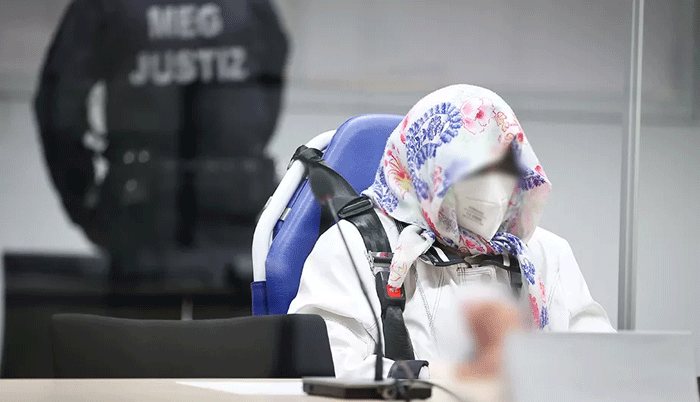
The court ordered that pictures of Irmgard Furchner from the trial should be blurred
BERLIN, Dec 21 (NNN-AGENCIES) — A former secretary who worked for the commander of a Nazi concentration camp has been convicted of complicity in the murders of more than 10,500 people.
Irmgard Furchner, 97, was taken on as a teenaged shorthand typist at Stutthof and worked there from 1943 to 1945.
Furchner, the first woman to be tried for Nazi crimes in decades, was given a two-year suspended jail term.
Although she was a civilian worker, the judge agreed she was fully aware of what was going on at the camp.
Some 65,000 people are thought to have died in horrendous conditions at Stutthof, including Jewish prisoners, non-Jewish Poles and captured Soviet soldiers.
Furchner was found guilty of aiding and abetting the murder of 10,505 people and complicity in the attempted murder of five others. As she was only 18 or 19 at the time, she was tried in a special juvenile court.
At Stutthof, located near the modern-day Polish city of Gdansk, a variety of methods was used to murder detainees and thousands died in gas chambers there from June 1944.
The court at Itzehoe in northern Germany heard from survivors of the camp, some of whom have died during the trial.
When the trial began in September 2021, Irmgard Furchner went on the run from her retirement home and was eventually found by police on a street in Hamburg.
Stutthof commandant Paul-Werner Hoppe was jailed in 1955 for being an accessory to murder and he was released five years later.
A series of prosecutions have taken place in Germany since 2011, after the conviction of former Nazi death camp guard John Demjanjuk set the precedent that being a guard was sufficient evidence to prove complicity.
That ruling also meant that civilian worker Furchner could stand trial, as she worked directly to the camp commander, dealing with correspondence surrounding Stutthof detainees.
It took 40 days for her to break her silence in the trial, when she told the court “I’m sorry about everything that happened”.
“I regret that I was in Stutthof at the time – that’s all I can say,” she said.
Her defence lawyers argued she should be acquitted because of doubts surrounding what she knew, as she was one of several typists in Hoppe’s office.
After the war, Furchner married an SS squad leader called Heinz Furchstam whom she probably met at the camp.
She went on to work as an administrative worker in a small town in northern Germany. Her husband died in 1972. — NNN-AGENCIES






